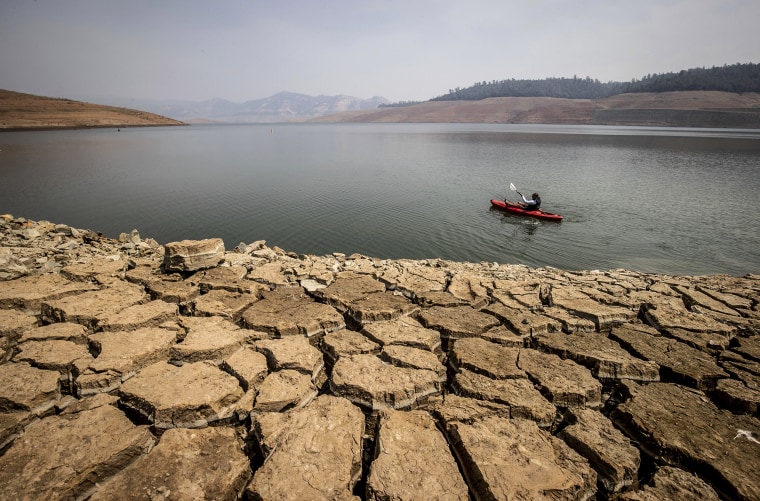Congressional leaders are calling on President Joe Biden to declare a drought disaster in the West as record temperatures and historic wildfires batter multiple states.
In a letter, Reps. Joe Neguse of Colorado and Jared Huffman of California, Democrats whose districts have been ravaged by drought and wildfires, joined 31 other lawmakers in asking Biden and the Federal Emergency Management Agency to release additional resources to aid Western communities faced with water cuts as supplies rapidly dwindle.
“There is little to no livestock feed available in the West, farmers are considering selling their livestock or land, and many species of wildlife are suffering from wildfires and lack of water,” Neguse and Huffman wrote in the letter, which was sent Wednesday. “This drought could have long-term impacts on the food supply, wildlife, and livelihoods of Americans in the West as these conditions persist.”
The letter supports a request this month from the governors of California, Colorado, Idaho, Montana, Nevada, New Mexico, North Dakota, Oregon, Utah and Washington. In their letter, the governors asked the Biden administration to declare a drought disaster in their states that would allow “agriculture communities to access funding beyond what is available through existing emergency programs.”
“Historic drought levels threaten to eliminate entire crops, depress yields and harbor extreme levels of pests and disease that add to the cumulative loss,” they wrote.
The federal government declared an unprecedented water shortage this month for the Colorado River and Lake Mead, triggering mandatory water cuts and opening a new chapter in the worsening struggle with drought in the West.
Water supplies from the Colorado River for Arizona, Nevada and parts of Mexico will be reduced starting in January after the U.S. Bureau of Reclamation, an agency of the Interior Department, issued a formal shortage declaration for the river for the first time.
Although the first round of cutbacks will affect mainly farmers, sparing cities and homes in the short term, further drops in Lake Mead’s water levels would trigger much deeper water reductions that could ultimately affect cities like Phoenix, Las Vegas and Tucson, Arizona, as well as parts of California.
The water shortage comes as 13 states are battling nearly 100 wildfires, which have burned more than 2.5 million acres this summer, according to the National Interagency Fire Center. Only one of the fires is fully contained.
The explosive Caldor Fire in Northern California, which has scorched more than 126,000 acres and is 11 percent contained, has forced thousands of people to evacuate their homes and devastated a mountain community. It is also “knocking on the door” of the Lake Tahoe basin, a popular destination for hiking, swimming and camping.
The Biden administration on Tuesday approved California’s request for a major disaster declaration, which will bolster emergency response and support efforts in Lassen, Nevada, Placer and Plumas counties related to the Dixie and River fires.
“We’re grateful that President Biden has declared a major disaster in California for the wildfires that started last month and continue to destroy homes and upend lives,” Democratic Sens. Dianne Feinstein and Alex Padilla of California said in a joint statement. “The disruption to so many lives is heartbreaking, and we must do all we can to help these families get their lives back on track.”

